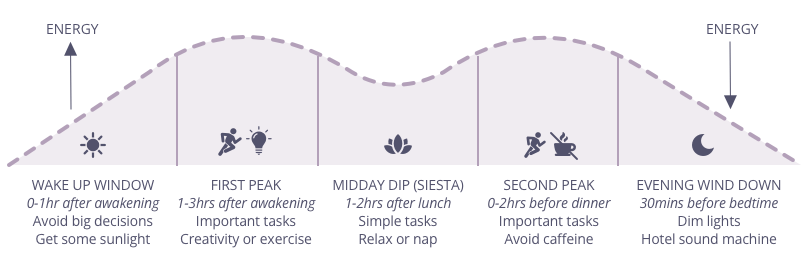Zeitgebers Defined
External and Internal Timekeepers that Impact Alertness
By Dr. Dan Gartenberg
Last Updated: March 30, 2023
Zeitgebers Overview
Zeitgebers, which is German for "time-givers," are environmental cues that help regulate an organism's circadian rhythm, or biological clock. Zeitgebers are like your body's timekeeper. They are cues given by the environment that reset the circadian rhythm. These cues literally impact the expression of our genes. The science of this process is called chronobiology.
Examples of external zeitgebers in humans are environmental cues like sunlight, exercise, and eating. When you do these activities and how much you do them impacts your circadian rhythm and energy levels throughout the day. Temperature and the even social interactions can also create environmental cues that tell your body when to be alert. These external cues reset the internal body clock, also known as your circadian rhythm. Naturally occurring sunlight is the strongest zeitgeber because of its impact on hormones like melatonin. Even when our eyes are closed, photoreceptors in the eye can detect sunlight. These photoreceptors respond to sunlight by inhibiting melatonin. Due to the fact that we have become indoor creatures, people are often out of touch with their circadian rhythm. This happens when you do not entrench your zeitgebers within your daily schedule.
Internal zeitgebers, on the other hand, are cues that come from within the body, such as the release of hormones like cortisol and melatonin. Cortisol is a hormone that helps regulate our sleep-wake cycle, while melatonin is a hormone that helps us fall asleep. When external and internal zeitgebers are in sync, our circadian rhythm operates smoothly, and we experience good sleep, alertness during the day, and other health benefits. However, disruptions to our zeitgebers, such as changes in our sleep schedule or exposure to bright lights late at night, can throw off our circadian rhythm and lead to problems such as insomnia, daytime sleepiness, and mood disturbances.

Circadian Entrenchment Solutions
Try to do the following things at a similar time every day:
• Sunlight in the morning when you wake up
• Similar bedtimes and wake times
• Eat at consistent times in the day and not too close to night
• Exercise at the same time every day
• Stimulate yourself with social interactions at the same time every day
Circadian Optimizer
The chart at the top of the Today screen in the Sleespace app is your circadian optimizer. This chart gives you insights on the best times to do different activities like sleep and exercise. Learn about your circadian optimizer. SleepSpace can also give you notifications on the best times to do different activities based on your unique circadian rhythm.
There are several things we can do to help regulate our zeitgebers and maintain a healthy circadian rhythm. These include:
-
Getting exposure to bright light in the morning. This can help reset our biological clock and improve our mood and energy levels throughout the day.
-
Keeping a consistent sleep schedule. Going to bed and waking up at the same time each day helps to regulate our circadian rhythm and improve the quality of our sleep.
-
Limiting exposure to bright lights at night. This can interfere with the release of melatonin, making it harder to fall asleep and stay asleep.
-
Maintaining a healthy lifestyle. Regular exercise, a healthy diet, and stress management can all help regulate our circadian rhythm and improve our overall health and wellbeing.

